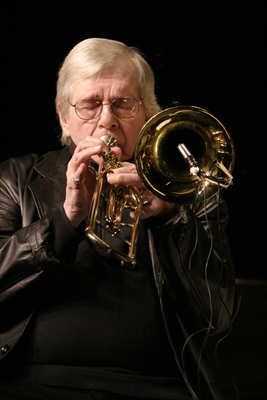I had lunch with Christopher Hitchens in 2000 at the behest of a mutual friend, and didn’t like him at all. Though he was perfectly nice to me, Hitchens struck me as snobbish and vain, the very model of an expatriate Brit frolicking among the ugly Americans at whom he delighted to sneer. We never met again.
Two years later, he gave my biography of H.L. Mencken an indifferent review in the New York Times. It may or may not have prejudiced me against his essays, which too often struck me as self-consciously contrarian rather than expressive of deep-seated convictions, of which I frankly doubt he had all that many.
I did, however, greatly admire (as who did not?) the courage with which he faced his fast-approaching end, as well as the stylish eloquence with which he described it in print. We should all be so brave–and so honest.
Ave atque vale.
UPDATE: In case you weren’t reading this blog in 2005, here‘s something I wrote back then about speaking ill of the recently dead. As you can see, I haven’t changed my mind–and Hitchens would have agreed with me.
Archives for December 16, 2011
TT: A master’s music
Here are five Bob Brookmeyer CDs of which I’m especially fond:
 • Bob Brookmeyer Quintet, Traditionalism Revisited, with Jimmy Giuffre and Jim Hall (1957)
• Bob Brookmeyer Quintet, Traditionalism Revisited, with Jimmy Giuffre and Jim Hall (1957)
• The Bob Brookmeyer Small Band, Live at Sandy’s Jazz Revival (1978)
• The Bob Brookmeyer New Art Orchestra, New Works: Celebration (1999)
• Holiday: Bob Brookmeyer Plays Piano (2001)
• The Bob Brookmeyer New Art Orchestra, Get Well Soon (2004)
TT: Bob Brookmeyer, R.I.P.
 Nothing you can say about Bob Brookmeyer can possibly rival the truth about him. He was one of the giants of jazz, a great valve trombonist, a composer of the first rank, and an astonishingly gifted teacher whose pupils included Maria Schneider. He was also a man of ear-shattering candor who liked nothing better than saying whatever was on his mind at any given moment, especially when he knew it would give offense. Unlikely as it may sound, he was genuinely lovable–unless you happened to be on the receiving end of one of his diatribes, and sometimes even then–and I adored him.
Nothing you can say about Bob Brookmeyer can possibly rival the truth about him. He was one of the giants of jazz, a great valve trombonist, a composer of the first rank, and an astonishingly gifted teacher whose pupils included Maria Schneider. He was also a man of ear-shattering candor who liked nothing better than saying whatever was on his mind at any given moment, especially when he knew it would give offense. Unlikely as it may sound, he was genuinely lovable–unless you happened to be on the receiving end of one of his diatribes, and sometimes even then–and I adored him.
I met Bob when I interviewed him in 1999 for a profile that appeared in the Sunday New York Times on the occasion of his seventieth birthday:
Today is the jazz trombonist Bob Brookmeyer’s 70th birthday, and he’s surprised. He never expected to outlive such illustrious colleagues as Al Cohn, Stan Getz, Gerry Mulligan and Zoot Sims, with whom he worked back in the days when he was doing his best to drink himself to death. “I didn’t think I’d see 30,” he said in the matter-of-fact tones of a man whose memories were horrendous enough to need no embroidery. “I almost didn’t make 45. My major accomplishment back then was not falling down more than, oh, 10 times a day.”
He was amused by what I wrote, and a friendship resulted. We didn’t see much of one another–he stayed as far away from Manhattan as he could–but our rare meetings were full of raucous laughter and much affection. Alas, what would have been our last meeting failed to take place because of the illness that claimed his life last night. He was too depressed to want to be seen, and I was too shy to insist on seeing him.
Now he is gone, but his music will always be with us, for which much thanks.
TT: (Still)born again
In today’s Wall Street Journal drama column, I sound the alarm about On a Clear Day You Can See Forever and Lysistrata Jones. Here’s an excerpt.
* * *
In the rogues’ gallery of problem musicals, “On a Clear Day You Can See Forever” ranks right next to “Candide” and “Merrily We Roll Along” at the very top of the list. The Burton Lane-Alan Jay Lerner score is so good that everyone who loves musical comedy dreams of seeing the show successfully revived, but Lerner’s book is so bad that no one has ever figured out how to do it. Now Michael Mayer, the director of “American Idiot” and “Spring Awakening,” has taken a costly shot at what most theater buffs have long thought impossible–and proved them right.
 The original “On a Clear Day” was the muddled story of Mark Bruckner, a Manhattan psychiatrist who hypnotizes a ditsy young client named Daisy and discovers that she appears to be the reincarnation of one Melinda Wells, an 18th-century society lady from London, with whom he thereupon falls in love. Daisy/Melinda was the star of the show–Barbara Harris played her on Broadway in 1965, Barbra Streisand in the even more confusing 1970 film version–and nobody got the girl(s). In the new “On a Clear Day,” whose book, written by Peter Parnell, retains recognizable chunks of Lerner’s 1965 script but has mostly been written from scratch, the shrink (Harry Connick, Jr.) is the star and his ditsy young client becomes a ditsy gay florist (David Turner) who appears to be the reincarnation of a beautiful swing-era big-band canary (Jessie Mueller).
The original “On a Clear Day” was the muddled story of Mark Bruckner, a Manhattan psychiatrist who hypnotizes a ditsy young client named Daisy and discovers that she appears to be the reincarnation of one Melinda Wells, an 18th-century society lady from London, with whom he thereupon falls in love. Daisy/Melinda was the star of the show–Barbara Harris played her on Broadway in 1965, Barbra Streisand in the even more confusing 1970 film version–and nobody got the girl(s). In the new “On a Clear Day,” whose book, written by Peter Parnell, retains recognizable chunks of Lerner’s 1965 script but has mostly been written from scratch, the shrink (Harry Connick, Jr.) is the star and his ditsy young client becomes a ditsy gay florist (David Turner) who appears to be the reincarnation of a beautiful swing-era big-band canary (Jessie Mueller).
Mr. Mayer is responsible for dreaming up this silly-sounding premise, and while I suppose it would be wrong to say that nobody in the world could ever have made it work onstage, he and Mr. Parnell have definitely failed to do the job….
Mr. Connick is, of course, a popular school-of-Sinatra swing balladeer who made a splash in the 2006 Broadway revival of “The Pajama Game.” His acting skills, however, are strictly limited, and whoever thought he was up to playing a Jewish shrink ought to have his head examined, preferably with a blunt instrument….
Douglas Carter Beane’s brand of flyweight camp is not to all tastes, but plenty of people flipped over “Xanadu,” and those unpicky folk are more than welcome to revel in “Lysistrata Jones,” in which Aristophanes’ classic comedy is turned into a spoofy-woofy college musical about an inept basketball team whose players are galvanized into action when their girlfriends vow not to sleep with them until they win a game. In the ever-relevant words of Max Beerbohm, “For people who like that kind of thing, that is the kind of thing they like.”
If you’re that kind of person, be forewarned that Mr. Beane’s book is vapid to the max and Lewis Flinn’s score is as tuneful as a ringtone medley….
* * *
Read the whole thing here.
TT: Almanac
“Biographies grasp the exteriors of lives and give what account they can of their interiors. These can be wholly different realities.”
Guy Davenport, “Ruskin”
